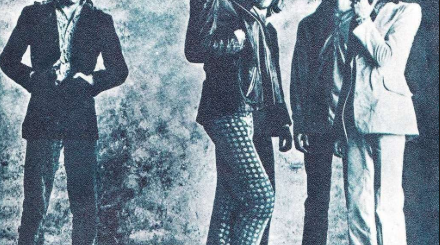(I Can’t Get No) Satisfaction by The Rolling Stones Lyrics Meaning – Unraveling the Anthem of Discontent
Lyrics
I can’t get no satisfaction
‘Cause I try, and I try, and I try, and I try
I can’t get no, I can’t get no
When I’m drivin’ in my car
And a man comes on the radio
He’s tellin’ me more and more
About some useless information
Supposed to fire my imagination
I can’t get no, oh no no no
Hey hey hey, that’s what I say
I can’t get no satisfaction
I can’t get no satisfaction
‘Cause I try, and I try, and I try, and I try
I can’t get no, I can’t get no
When I’m watchin’ my TV
And a man comes on and tells me
How white my shirts can be
Well he can’t be a man ’cause he doesn’t smoke
The same cigarettes as me
I can’t get no, oh no no no
Hey hey hey, that’s what I say
I can’t get no satisfaction
I can’t get no girl reaction
‘Cause I try, and I try, and I try, and I try
I can’t get no, I can’t get no
When I’m ridin’ ’round the world
And I’m doin’ this and I’m signin’ that
And I’m tryin’ to make some girl
Who tells me, “baby better come back later next week
‘Cause you see I’m on losin’ streak”
I can’t get no, oh no no no
Hey hey hey, that’s what I say
I can’t get no, I can’t get no
I can’t get no
Satisfaction, no satisfaction, no satisfaction, no satisfaction
I can’t get no
Released in 1965, The Rolling Stones’ ‘(I Can’t Get No) Satisfaction’ rapidly became the anthem of a generation, capturing the spirit of an era caught in the tension between post-war prosperity and individual disillusionment.
More than just a catchy riff, Mick Jagger’s restless vocal delivery and Keith Richards’ iconic guitar line is a raw exposition into the consumer culture, media influence, and the quest for authentic personal fulfillment.
The Quest for Authenticity in a Consumerist World
Jagger’s lyrics echo the frustration of seeking something more substantial than the materialistic culture that was burgeoning in the mid-60s. The reference to the radio and TV man signifies a broader comment on the media’s role in perpetuating a cycle of dissatisfaction.
It’s a powerful display of irony where even the white shirts and cigarettes, symbols of societal success, fail to translate into a genuine sense of achievement.
The Guitar Riff Heard Around the World
That opening riff has become one of the most recognizable sounds in rock history. It’s the sonic embodiment of the frustration felt not just by The Stones but by a generation struggling to align personal values with societal expectations.
Keith Richards’ fuzz-toned chords act as Jagger’s co-conspirator in crime, giving a literal voice to that sense of yearning for an elusive satisfaction.
Unearthing the Song’s Hidden Commentary on Media Influence
Beneath the surface, ‘Satisfaction’ presents a scathing critique of media influence, with advertisers as puppet masters. These lines speak to the individual’s grappling with identity in a commercialized culture, questioning what is sold as ‘satisfaction’.
This deeper meaning cannot be detached from the Stones’ historical context, speaking to the commercial onslaught of the Beatlemania era, and yet, it feels ever-relevant in today’s digital age.
The Enduring Symbol of Youthful Rebellion
This track isn’t merely a song; it’s a symbol. It represents a refusal to accept the status quo, an inherent part of youthful rebellion that has reasserted its relevance across decades.
The Stones crafted not just a musical hit but a timeless call to arms, inviting listeners to demand more from life, culture, and the powers that be.
Memorable Lines that Still Resonate
‘When I’m drivin’ in my car, And the man comes on the radio’ – these lyrics encapsulate the immediate intrusion of the advertisement world into personal space, suggesting that not even our own vehicles can be a haven from societal pressures.
‘How white my shirts can be’ continues to strike a chord as it highlights the absurdity of commercial claims infringing upon self-worth, an aspect of consumer culture that remains omnipresent and questioned by modern audiences.








